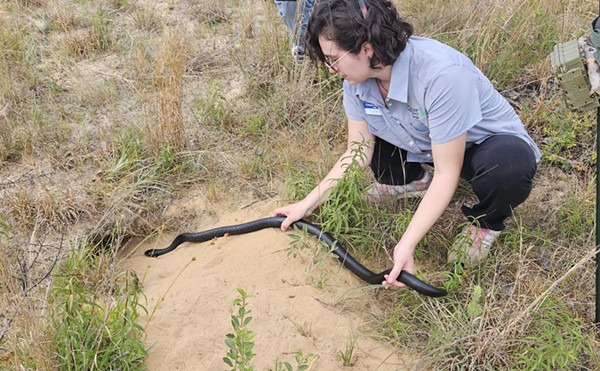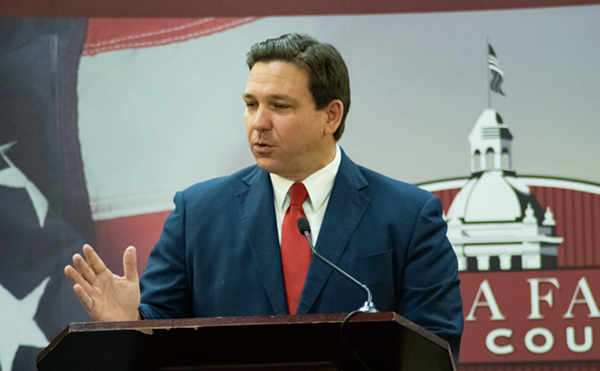A new report out today confirms what most Floridians probably already assumed - that the the state's four largest electric utility companies wield too much influence in Tallahassee.
Integrity Florida's study, called, "Power Play: Political influence of Florida's top energy corportations,' details what any discerning probably already knows - that the Legislature and the Public Service Commission routinely side with TECO, Duke Energy (formerly Progress Energy), Florida Power & Light and Gulf Power.
"The corrupting influence of money in politics is the defining issue of our time," says Dan Krassner, executive director of Integrity Florida. "We have a legislature that is not broken, it's bought."
However, the report is already being debunked by energy company officials who question its fairness. Integrity Florida acknowledges that the study was funded from a grant provided by the Southern Alliance for Clean Energy (SACE), who have been fighting the utilities on different policy issues over the years. A spokesman for FPL, Mark Bubriski, told Mary Ellen Klas in the Miami Herald that SACE is an "anti-utility organization," and said "It's not a report by Integrity Florida, it's a report by SACE. Integrity Florida was bought out by SACE."
TECO spokesperson Cherie Jacobs told CL that that "our customers are paying significantly below the national average," specifically nine percent lower. She says that the average TECO customer is $109 per month, vs $121.
But the report lays out in detail some of the facts on the ground as it stands on the industry's powerful hold on the Legislature, and they certainly aren't beneficial to the average Florida energy consumer. Such as the fact that four of the five PSC commissioners who voted against rate hike requests by FPL and (then)Progress Energy in 2009-2010 all lost their jobs within a few months time.
The report says that the four companies spent more than $12 million lobbying members of the Legislature between 2007 and 2013, and have contributed more than $18 million to state-level candidates and party organizations between the 2004 and 2012 election cycles.
Integrity Florida offers a list of prescriptions to make things better for consumers.
1. Uniform ethics rules for legislators and local officials. If local officials are banned from legislative lobbying, then apply the same rules to legislators lobbying local officials.
2. Put inspector general reports online. Inspector general investigative reports and audits should be posted online by the Florida Public Service Commission and all state agencies. If internal government watchdogs conduct an investigation of potential corruption, fraud, waste or abuse, the public should know about it and be able to read the report online. These reports and audits are already public records but they are typically not posted online for the public to know they exist.
3. Put gift and client disclosures made by state lawmakers and regulators online. Ensure full compliance with gift and client disclosures by lawmakers and state regulators. Florida legislators are already required to file disclosures when they receive gifts and they must file quarterly client disclosures if their professional firms have clients with business before state government. These forms are presently public records but they are only available upon request and sometimes for a fee. Gift disclosures and quarterly client disclosures should be posted online for the public to access at no charge.
4. Make campaign donations from vendors and state regulated industries more transparent. Require added disclosure if a donor is a state government vendor or a company regulated by the Public Service Commission. Implement a mandatory statewide filing system and enhanced campaign finance database with unique identification numbers for donors who are state government vendors or companies regulated by the Public Service Commission. State government vendor identification numbers could be used as the common reference related to each contribution. Large corporations often have parent companies, subsidiaries, multiple office addresses and several variations of their corporate names, factors which make tracking their campaign dollars challenging. The public would benefit from a full scale use of unique campaign contributor information from all donors.
5. Electric bill transparency. Unbundle bills with detailed disclosure of rate components. Floridians deserved to know what they are
paying for, especially in the cases where major infrastructure projects are pursued by electric utilities that may or may not go online. Customers should receive more detailed bills with all components of their electric rate and special infrastructure projects unbundled and clearly disclosed. In addition, the PSC website should provide easy public access to rate history information for every company they regulate.
In the Appendix, the report features a Q& with former Pasco County state legislator Mike Fasano, who was known to be a fierce critic of the utility industry in Florida.
















